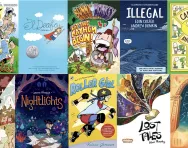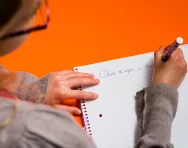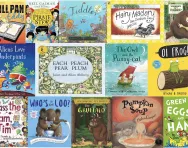Important update from TheSchoolRun
For the past 13 years, TheSchoolRun has been run by a small team of mums working from home, dedicated to providing quality educational resources to primary school parents. Unfortunately, rising supplier costs and falling revenue have made it impossible for us to continue operating, and we’ve had to make the difficult decision to close. The good news: We’ve arranged for another educational provider to take over many of our resources. These will be hosted on a new portal, where the content will be updated and expanded to support your child’s learning.
What this means for subscribers:
- Your subscription is still active, and for now, you can keep using the website as normal — just log in with your usual details to access all our articles and resources*.
- In a few months, all resources will move to the new portal. You’ll continue to have access there until your subscription ends. We’ll send you full details nearer the time.
- As a thank you for your support, we’ll also be sending you 16 primary school eBooks (worth £108.84) to download and keep.
A few changes to be aware of:
- The Learning Journey weekly email has ended, but your child’s plan will still be updated on your dashboard each Monday. Just log in to see the recommended worksheets.
- The 11+ weekly emails have now ended. We sent you all the remaining emails in the series at the end of March — please check your inbox (and spam folder) if you haven’t seen them. You can also follow the full programme here: 11+ Learning Journey.
If you have any questions, please contact us at [email protected]. Thank you for being part of our journey it’s been a privilege to support your family’s learning.
*If you need to reset your password, it will still work as usual. Please check your spam folder if the reset email doesn’t appear in your inbox.
5 tips on inspiring your funny child to write jokes

Having written two joke books and five comedy adventures, I guess it’s partly my fault if your child buys a copy and then follows you around the house reciting pun after pun. I get it, I have two kids of my own and I’ve been there, trying to cook dinner or put a wash on with a little voice behind you asking, "How many teachers does it take to change a lightbulb?"*
Believe it or not, joke books don’t just exist to annoy parents. They are very popular with reluctant readers who find a chapter book too daunting. When I ran joke-writing workshops, I discovered that sharing and teaching the art of pun writing is a really rewarding, fun and creative process.
So, I wanted to share with you five key tips on how to encourage your kids to write their own jokes. These are the things I’ve learnt throughout my 25-year comedy writing career and, hopefully, they will show you how you can nurture some joke writing skills from your children and perhaps inspire them to be the next big stand-up comedian. Although, having performed on the stand-up comedy circuit they will have to learn to deal with more brutal heckles than "not now darling, I’m in the middle of cooking your fish fingers."
*The answer is: Sum
Comedy writing tip 1: Why is it funny?
It’s almost impossible to work out why children find things funny and equally why they don’t find something funny. When my daughter was a toddler, she used to fold her arms, look quite cross and tell me I was too silly. My son hated pantomimes from a really young age – he just didn’t get what was funny about them. So, when a child tells me they laughed at a scene or a joke from one of my books I always ask “why?” They usually reply, “it’s silly”, or “I imagined it and it made me laugh”, or often they say that it relates in some way to something that happened in their own lives. Be curious as to what tickles your kids and then simply ask them to try and explain.
Comedy writing tip 2: Follow the rules
Pun writing isn’t as hard as you think, but that doesn’t mean that what you write will be funny. However, it doesn’t really matter, as getting your children to try and write their own jokes is a great way to inspire creativity, flex their funny bones and encourage them to look at how words are formed and how language works.
Show them that if they take a word (the month they were born, the day of the week, the town where they live etc.) and really look at it closely, then split it in two, they will see that it’s usually made up of two words. They don’t even have to be real words. For instance – Wednesday – the word Wednes (read as wens) works well as a pun because it sounds like when’s (a contraction of when is). For instance: Wednes the next tip coming? – oh, here it is…
Comedy writing tip 3: Start at the end
The best way is to work backwards and start with the punchline. Take the day of the week for instance, let’s say Monday. Split it in two – Mon and Day. Now find words that rhyme with the first part, in this instance Mon rhymes with fun, run and pun. Then put them back together and create new words, Funday, Runday, Punday.
Once your child has made a nice list of new words (these will form the punchline) all you need to do is get them to write the question that leads up to that punchline:
What is the most enjoyable day of the week? – Funday
What is the most exhausting day of the week? – Runday
What day of the week is the best for telling jokes? Punday
Comedy writing tip 4: Get performing
In our workshops we encourage children to perform their new jokes in front of the others. Seeing the pride on their faces when they get their first laugh from an audience is priceless. So, try to encourage your kids to perform their very own stand-up comedy routine and bring the laughter to your friends and family. It reminds me of when I did stand-up comedy… what? I did get laughs!
Comedy writing tip 5: Remember to laugh
Okay, so their first attempts might not be hilarious, but you have to encourage them – even if that just means you have to perfect a convincing fake laugh. Sorry.
For more inspiration, check out Steven’s new joke book How to be the Funniest Kid in School, which he co-wrote with popular television writer and author Ivor Baddiel.






